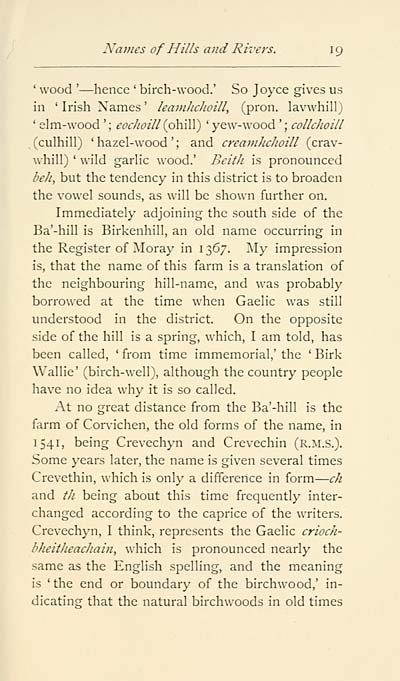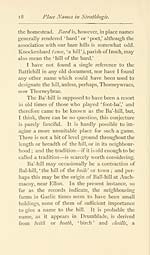Blair Collection > Place names in Strathbogie, with notes historical, antiquarian and descriptive
(39)
Download files
Complete book:
Individual page:
Thumbnail gallery: Grid view | List view

Na7)ies of Hills and Rivers. 19
' wood ' — hence ' birch-wood.' So Joyce gives us
in 'Irish Names' leamJicJioill^ (pron. lavwhill)
' elm-wood ' ; eochoill (ohill) ' yew- wood ' ; collcJioill
^ (culhill) ' hazel-wood ' ; and creamhchoill (crav-
whill) ' wild garlic wood.' BeitJi is pronounced
beh, but the tendency in this district is to broaden
the vowel sounds, as w'ill be shown further on.
Immediately adjoining the south side of the
Ba'-hill is Birkenhill, an old name occurring in
the Register of Moray in 1367. ]\Iy impression
is, that the name of this farm is a translation of
the neighbouring hill-name, and was probably
borrowed at the time when Gaelic was still
understood in the district. On the opposite
side of the hill is a spring, which, I am told, has
been called, ' from time immemorial,' the ' Birk
Wallie' (birch-well), although the country people
have no idea why it is so called.
At no great distance from the Ba'-hill is the
farm of Corvichen, the old forms of the name, in
1 541, being Crevechyn and Crevechin (r.m.s.).
Some years later, the name is given several times
Crevethin, which is only a difference in form — ch
and th being about this time frequently inter-
changed according to the caprice of the writers.
Crevechyn, I think, represents the Gaelic crioch-
hheitheachain, which is pronounced nearly the
same as the English spelling, and the meaning
is ' the end or boundary of the birchwood,' in-
dicating that the natural birchwoods in old times
' wood ' — hence ' birch-wood.' So Joyce gives us
in 'Irish Names' leamJicJioill^ (pron. lavwhill)
' elm-wood ' ; eochoill (ohill) ' yew- wood ' ; collcJioill
^ (culhill) ' hazel-wood ' ; and creamhchoill (crav-
whill) ' wild garlic wood.' BeitJi is pronounced
beh, but the tendency in this district is to broaden
the vowel sounds, as w'ill be shown further on.
Immediately adjoining the south side of the
Ba'-hill is Birkenhill, an old name occurring in
the Register of Moray in 1367. ]\Iy impression
is, that the name of this farm is a translation of
the neighbouring hill-name, and was probably
borrowed at the time when Gaelic was still
understood in the district. On the opposite
side of the hill is a spring, which, I am told, has
been called, ' from time immemorial,' the ' Birk
Wallie' (birch-well), although the country people
have no idea why it is so called.
At no great distance from the Ba'-hill is the
farm of Corvichen, the old forms of the name, in
1 541, being Crevechyn and Crevechin (r.m.s.).
Some years later, the name is given several times
Crevethin, which is only a difference in form — ch
and th being about this time frequently inter-
changed according to the caprice of the writers.
Crevechyn, I think, represents the Gaelic crioch-
hheitheachain, which is pronounced nearly the
same as the English spelling, and the meaning
is ' the end or boundary of the birchwood,' in-
dicating that the natural birchwoods in old times
Set display mode to: Large image | Transcription
Images and transcriptions on this page, including medium image downloads, may be used under the Creative Commons Attribution 4.0 International Licence unless otherwise stated. ![]()
| Early Gaelic Book Collections > Blair Collection > Place names in Strathbogie, with notes historical, antiquarian and descriptive > (39) |
|---|
| Permanent URL | https://digital.nls.uk/81166814 |
|---|
| Description | A selection of books from a collection of more than 500 titles, mostly on religious and literary topics. Also includes some material dealing with other Celtic languages and societies. Collection created towards the end of the 19th century by Lady Evelyn Stewart Murray. |
|---|
| Description | Selected items from five 'Special and Named Printed Collections'. Includes books in Gaelic and other Celtic languages, works about the Gaels, their languages, literature, culture and history. |
|---|

